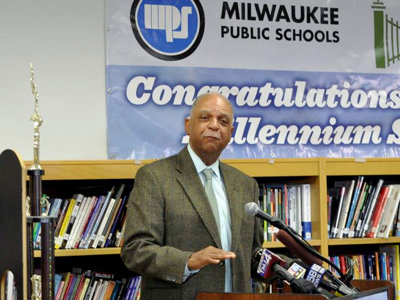It’s kids and family week here at OnMilwaukee.com and, more than ever, we’ll feature articles and blogs about children’s health, education, travel, fun and more. Kids and family week is brought to you by Aurora Health Care.
Now that my boss, Dr. Gregory Thornton, has nearly finished his tenure at the helm of Wisconsin’s largest school district, it’s time to look back on his performance and, because I am a teacher and this is how I live my life, offer him a report card. His four years here have been a bit of a mixed bag, but overall, he was more successful than his last few predecessors at the Milwaukee Public Schools.
When Thornton leaves for Baltimore on June 30, he will be replaced, on an interim basis, by current MPS innovation officer Dr. Darienne Driver.
Public Relations: D+
These categories are coming at you in no particular order, but there’s little doubt that one of the most important aspects of the job of superintendent, especially in a district like MPS, is managing the district’s image and public perceptions of the district’s quality. Here, Thornton’s had some ups and downs. On the one hand, stories about MPS’ relentless slide to the bottom of national rankings have stopped – in part, I think, because we actually got to the bottom and there’s no more slide to report on, and in part because for the last year or two things really are moving back upward. On the other hand, the public perception of the district has not improved. It doesn’t seem to matter that MPS has some of the top schools in the state; the fact that we also have the worst schools dominates the public image. Enrollment keeps falling – although, on a technicality, it rose a teensy bit in this past year – as parents leave the public schools for something they perceive as better.
State Relations: C
There’s little question (in my mind, anyway) that Thornton was hired to stop a takeover of the Milwaukee Public Schools by the state or, at the direction of the state, by the City of Milwaukee. When the last superintendent announced his retirement, it was at a time when the above-mentioned slide to the bottom was obvious and pronounced and the calls for a takeover were loud and everywhere. The Board, in a bit of a middle finger to the takeover crowd, said “Here, we picked a nationally-recognized figure, a strong African-American leader with a proven record of reform. Now just try to undermine him with a takeover.” And sure enough, the takeover talk mostly disappeared. Aside from that (which is huge! it keeps him from failing this category!), there is little to be said for MPS’s relationship with state leaders. The Department of Public Instruction continues to cinch its “corrective action plan” around the district’s neck; the legislature has no interest in fairly funding the district or curbing the competition from vouchers, charters, and suburban schools; the governor, I get the sense, would be happy to push the metaphorical plunger igniting the demolition charges that bring MPS down. Sure, some of this is electoral bad luck – Thornton came in with a Republican wave election and Milwaukee legislators are excluded from leadership positions. But those Republicans have been aiming at MPS with initiative after initiative the past couple of years, and Thornton hasn’t been able to get the target of MPS’ back.
Finances: A-
It’s hard to be objective on this one, since I can sit here and type in one window and look at how much my take-home pay has been cut in another. Luckily, objective people out there – like Milwaukee’s indispensable Public Policy Forum – have done the work for me. PPF says the most recent MPS budget outlook is “vastly improved” from where they saw the district’s finances just two years ago. PPF does say that future budgets are still “daunting”: “MPS lacks the wherewithal to keep up even with inflationary increases in personnel costs without enrollment gains or greater support from the state – two variables that are mostly beyond its control,” they say. However, they have unreserved praise for cost-cutting done under Thornton’s watch, saying the district “should be proud,” and that the budget is “good news.” Further, Thornton has done a great job of boosting private investment in MPS, working with General Electric and the Greater Milwaukee Committee and City Year and other groups to bring money and resources to MPS schools outside of what the state offers.
Board Relations: B+
Thornton, by all accounts, is a back-room kind of guy; he likes to work one-on-one, and get deals done on a handshake. In this way, it seems like he’s been able to keep from having many public disagreements with the Milwaukee Board of School Directors. This, if you know your MPS history, is a big deal. This is not to say there have been no fights – especially early on, Thornton and the Board went toe-to-toe on things like outsourcing MPS food services. But repeatedly the Board has rewarded Thornton with raises and contract extensions, and even though they probably always knew they’d never be able to keep the East-Coaster here in Milwaukee forever, it sure seems like they wanted him to stick around.
Union Relations: B
Milwaukee superintendents don’t just have a history of strained relations with the boards that hired them, but also with the union employing their teachers, aides, and other employees. Let’s be clear – after Wisconsin Act 10, which really decimated public employee unions’ strength in this state, Thornton and the MPS administration could have bulldozed past the unions entirely. After Act 10, the Milwaukee Teachers Education Association might have lost membership and shrunk to a small, impotent relic. Neither of those things happened; MPS is willing to bargain, and MTEA maintained a strong membership post-Act 10 with a leader willing to work with the administration rather than against. Despite some well-publicized disputes – such as a proposal to turn failing schools over to non-union charter operators, possibly resulting in layoffs –MTEA and MPS are doing more collaborative work than I have ever seen in my time in MPS, including plenty of district-union work groups and MTEA members released to work side-by-side with administration on major initiatives like teacher evaluation. The board just passed a new compensation package for teachers that actually isn’t awful and was written in collaboration with MTEA, and has worked with MTEA on the union’s priority to bring back art and music to the district. It’s not all roses and ponies and rainbows, of course, but compared to the way the previous administration clashed with MTEA (the last superintendent once got up in my face wagging his finger at a town hall meeting), Thornton has done pretty well.
Student Achievement: C
I know I said there was no particular order to these categories, but this one comes last because, frankly, I am not sure what to say here. I almost went with “Incomplete,” but that’s probably a cop-out even if it is too early to judge the effects of Thornton’s initiatives, like increasing the number of partnership schools and whether the boost in art and music instruction will pay off in better student engagement and growth. A C might be a cop-out too, I suppose, suggesting that I don’t know what to say except he’s not failing or far surpassing expectations. But there are some positive signs – as I noted, the slide has started to reverse itself and MPS students are scoring a little bit better on national and state exams. They’re graduating at a bit better rate than they did a few years ago, and earning more scholarship money. But serious challenges remain, including a third of the district’s schools being on the state’s failing list, far too many dropouts and students stuffed into remedial courses when they get to college.
Overall: B-
A B- suggests Thornton’s time here was above average but with a lot of room for improvement. I can’t think of any better way to describe the last four years. I don’t envy him the job, and I certainly don’t envy whoever his eventual replacement will be. When Thornton got here, MPS was a disjointed mess of failed initiatives, budgetary distress and sagging teacher, student, and parent morale; though both of those situations are far improved, in many ways MPS is still a mess. Its long-term finances are still a challenge, its overall student achievement is still awful, and its relationship with the state and the general public is still strained. But as a vast improvement on the previous decade or so, Thornton’s time guiding MPS has been better than I might have hoped four years ago when he was hired.


 i evaluate to yes even if there's no image
i evaluate to yes even if there's no image  i evaluate to yes even if there's no image
i evaluate to yes even if there's no image  i evaluate to yes even if there's no image
i evaluate to yes even if there's no image  i evaluate to yes even if there's no image
i evaluate to yes even if there's no image  i evaluate to yes even if there's no image
i evaluate to yes even if there's no image  i evaluate to yes even if there's no image
i evaluate to yes even if there's no image